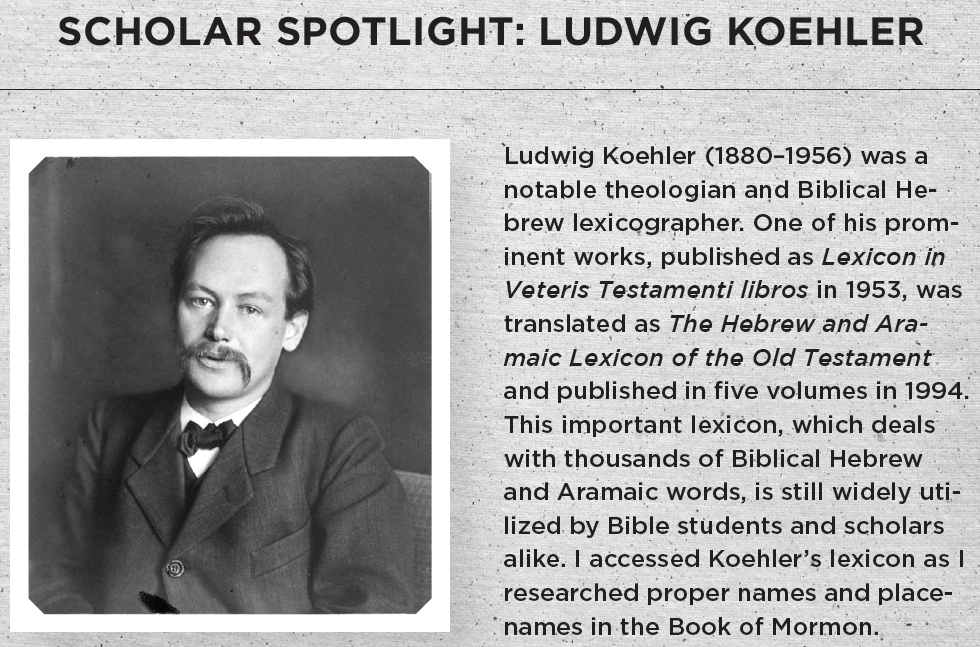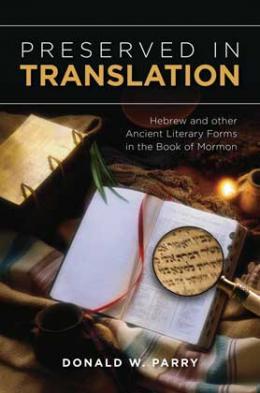Wordplays
Donald W. Perry, “Wordplays,” in Preserved in Translation: Hebrew and Other Ancient Literary Forms in the Book of Mormon (Provo, UT: Religious Studies Center, Brigham Young University; Salt Lake City: Deseret Book), 137‒42.
"Alma . . . was a young man" (Mosiah 17:2)
The Book of Mormon has 337 proper names, 188 of which are unique.[1] Many of the names unique to the Book of Mormon have Hebrew qualities or Hebraic features that demonstrate what researcher Paul Y. Hoskisson calls an “affinity with Semitic languages.” He notes the following examples: “Abish and Abinadi resemble ab, father, names in Hebrew; Alma appears in a Bar Kokhba letter (c. A.D. 130) found in the Judean desert; Mulek could be a diminutive of West Semitic mlk, king; Omni and Limhi appear to have the same morphology as Old Testament Omri and Zimri.”[2]
One feature of the Hebrew Bible is a kind of wordplay in which a proper name is juxtaposed with phrasing that corresponds with the meaning of the name. Although the Hebrew Bible has many instances of wordplay, once the text is translated into another language, such as English, the wordplay is lost on the average reader unless noted by the translators. When Leah bore her first son, she named him Reuben, which literally means “Look, a son!” Genesis 29:32 explains the wordplay: Leah “bare a son, and she called his name Reuben: for she said, Surely the Lord hath looked upon my affliction.” Leah named her fourth son Judah, meaning “praise.” Genesis 29:35 explains the wordplay: Leah “bare a son: and she said, Now will I praise the Lord: therefore she called his name Judah.” Asher’s name means happy; he was so named because Leah said, “Happy am I, . . . and she called his name Asher” (Genesis 30:13). Rachel, too, named Naphtali (which means wrestling) because, as she explains, “With great wrestlings have I wrestled with my sister, and I have prevailed” (Genesis 30:8).
The Book of Mormon narrative begins squarely in the world of the Bible. When Lehi’s clan traveled from the Old World to the New, they took with them the Hebrew language as well as Hebraic features in their writings that included wordplays using both human names and place-names. Once again, such wordplays were generally lost in translation. In recent decades Hebrew scholars have identified several wordplays in the Book of Mormon. “Book of Mormon writers not only understood the meaning of the names,” one scholar has written, “but abundantly employed wordplay—including thematic wordplay revolving around particular names.”[3]
Briefly examined below are three representative examples of wordplay in the Book of Mormon.[4]
Jershon
When the people of Anti-Nephi-Lehi sought refuge from those who were seeking to destroy them, a group of Nephites gave them the land of Jershon “for an inheritance” (Alma 27:22). The name Jershon is not found in the Bible, but it “has an authentic Hebrew origin, the root YRŠ, meaning ‘to inherit.’”[5] English transliterates Y with J; thus the Hebrew Yershon becomes Jershon in English. Three different passages in the book of Alma present wordplays linking Jershon with inherit or inheritance: “This land Jershon is the land which we will give unto our brethren for an inheritance” (27:22); “This will we do unto our brethren, that they may inherit the land Jershon” (27:24); and “They have lands for their inheritance in the land of Jershon (35:14).

If YRŠ (JRŠ) denotes inherit or inheritance, what about the -on suffix: Jersh-on? It also has a Hebrew connection. There are several dozen ancient place-names in the Bible and other ancient sources that feature the -on suffix.[6] These include Dishon (Genesis 36:21), Dibon (Numbers 21:30), Heshbon (Numbers 21:30), Ziphron (Numbers 34:9), Gibeon (Joshua 9:3), Hebron (Joshua 10:36), Eltekon (Joshua 15:58), Elon (Joshua 19:42), Hannathon (Joshua 19:14), Hammon (Joshua 19:28), Gibbethon (Joshua 19:44), Holon (Joshua 21:15), Ashkelon (Judges 1:18), and Helbon (Ezekiel 27:18).
Alma
The name Alma gives us “one of the most transparent examples of onomastic wordplay [or wordplay dealing with a proper name] in the Book of Mormon.”[7] The name is related to the Hebrew ʿalm (or ʿelem), meaning “youth” or “young man”.[8] In Mosiah 17:2, the name Alma is juxtaposed with “young man”: “There was one among them whose name was Alma [ʿalmāʾ], he also being a descendant of Nephi. And he was a young man [ʿalm].” Hugh Nibley was the first scholar to associate Alma with “young man”;[9] subsequently, his proposal has been accepted by several Hebrew scholars.[10]
Zarahemla
Some Latter-day Saint scholars[11] have proposed that the name Zarahemla is based on two Hebrew words, zera (“seed”) and hemlah (from a Hebrew verbal root meaning “to have compassion, to spare”).[12] Both meanings of hemlah are contextually linked to the name Zarahemla in Book of Mormon passages.
Alma 27:4–5 states that Ammon and his brothers were “moved with compassion, and they said unto the king: Let us gather together this people of the Lord, and let us go down to the land of Zarahemla” (Alma 27:4–5; see also 53:10–13). Two passages provide a similar linkage using spare: “We returned, those of us that were spared, to the land of Zarahemla” (Mosiah 9:2) and “Then would our brethren have been spared, and they would not have been burned in that great city Zarahemla” (3 Nephi 8:24).[13]
Bible scholar Matthew Bowen has observed that allusion and wordplay involving personal names “saturate the narratives and poetry of the Hebrew Bible.” He states further that “identifying this wordplay and how it functions in biblical narrative constitutes an important key to understanding those narratives and the messages intended therein by their ancient authors.”[14] Bowen’s point also pertains to wordplay in the Book of Mormon, reminding us that such literary devices serve rhetorical purposes that may afford insights into a passage’s fuller context and meaning.
Notes
[1] See Hoskisson, “Book of Mormon Names,” 1:186, where he qualifies his count and explains his methodology.
[2] Hoskisson, “Book of Mormon Names,” 1:186–87.
[3] Bowen, Name as Key-Word, lxviii.
[4] See the studies of various scholars who have investigated other names, including Sariah, Josh, Sam, Laman, Lemuel, Irreantum, and Nahom, in Chadwick, “Names Lehi and Sariah—Language and Meaning”; Ricks, “Origin of Book of Mormon Names”; Ricks, “Some Notes on Book of Mormon Names”; and Bowen, Name as Key-Word.
[5] Ricks and Tvedtnes, “Hebrew Origin of Some Book of Mormon Place Names,” 257. See Brown, Hebrew and English Lexicon of the Old Testament, 439–40, which defines yrš as “take possession of; inherit; dispossess”; and Koehler and Baumgartner, Hebrew and Aramaic Lexicon of the Old Testament, 441–42, which defines yrš as “to take possession of.”
[6] See Ricks and Tvedtnes, “Hebrew Origin of Some Book of Mormon Place Names,” 258n15.
[7] Bowen, “And He Was a Young Man,” 343. See the discussions on Alma’s name in Ricks, “Some Notes on Book of Mormon Names,” 159–60; and Bowen, Name as Key-Word, 91–98.
[8] See Koehler and Baumgartner, Hebrew and Aramaic Lexicon of the Old Testament, 835.
[9] See Nibley, Approach to the Book of Mormon, 59.
[10] See Hoskisson, “Textual Evidences for the Book of Mormon,” 288–89; Bowen, “And He Was a Young Man,” 343; Ricks, “Some Notes on Book of Mormon Names,” 159–60; and Bowen, Name as Key-Word, 91–98.
[11] See Bokovoy and Olavarria, “Zarahemla: Revisiting the ‘Seed of Compassion’”; Bowen, Name as Key-Word, 98–100; Bowen, “Toponymic Wordplay on Zarahemla and Jershon”; Ricks, “Notes on the Book of Mormon Names Zeezrom and Jershon”; Ricks and Tvedtnes, “Hebrew Origin of Some Book of Mormon Place Names,” 258–59; Tvedtnes, “Since the Book of Mormon Is Largely the Record of a Hebrew People,” 65; and Tvedtnes, “What’s in a Name?,” 42.
[12] Koehler and Baumgartner, Hebrew and Aramaic Lexicon of the Old Testament, 328.
[13] See Bowen, Name as Key-Word, 119–33.
[14] Bowen, Name as Key-Word, xlv.
